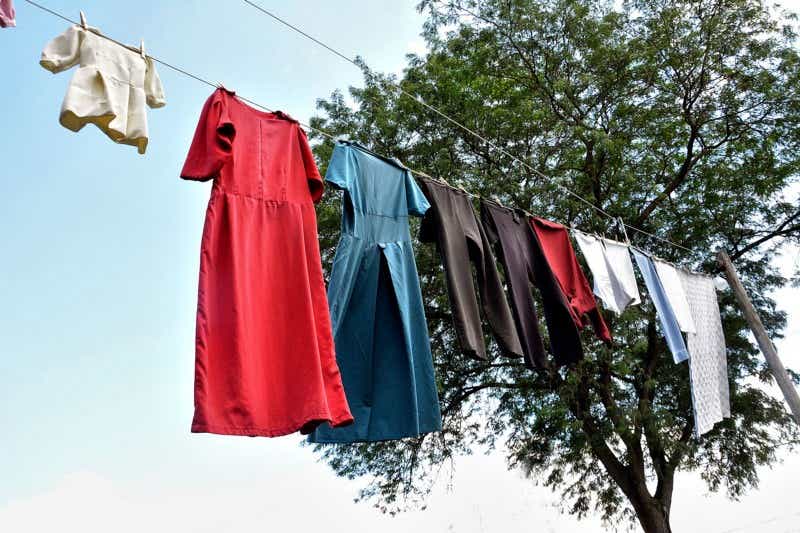Sarah McClure opens up about her year-long reporting process
Cosmopolitan, in conjunction with Type Investigations, published a blockbuster report this week: An investigation into the Amish community’s #MeToo problem. After reading the report, we were eager to learn more. So we spoke with investigative journalist and documentary filmmaker Sarah McClure. She opened up about her year-long reporting process and shared why she hopes this inspires other journalists to take a look at this underserved community.
Lisa Ryan, editor: So first of all, your reporting is so powerful — and really upsetting. What drew you to this issue?
Sarah McClure: I had been working full time at networks, and briefly at the Wall Street Journal. A friend of mine worked at Type Investigations and she was looking for pitches. I sent her the story, but I was actually looking into opioid-use among the Amish. But as I began talking with Amish women and men, the thing that kept coming up in our conversations was: “Do you know about the sexual abuse?”
How did the rise of the #MeToo movement reach the Amish community? Did it encourage the victims of sex abuse to speak out?
I can’t speak to how these women heard of the movement, or when they first came to know about this grassroots movement happening in their own culture. But I do know from speaking with women from many different states — I can’t really get into which ones to protect their identities — that they’ll get together and have these private groups, where they go around the circle and tell each other what abuse they endured.
I was invited by one person and was completely transparent that I’m a journalist; I’m just here to observe. I said something to the effect of “I feel like there’s this Amish #MeToo movement happening,” and a couple of the women raised their hands and they said, “What’s #MeToo?” There’s a lot of Amish women who just don’t know what that term is.
But what I have been finding is that, based on conversations with advocates, these groups have just come out of the shadows within the last three years. It’s well-reported that when you do see an actual Amish sexual assault case — the very rare times that you do see one — the entire community will stand behind the abuser. And so the victim, they are completely on their own.
For Lizzie, in my story, that was the situation… But these women came out and supported her. After her hearing, this group was formed. And so I feel that… the need to grow this really grassroots movement is happening right now. These women are so fired up, and they are so ready to tell people stories.
You note that a “perfect storm” of factors has led to the sexual abuse crisis in Amish culture. Can you tell us what those factors are, and why they led to that?
I mentioned this in the piece, but there isn’t really one factor — it’s just many things. It’s a combination of the patriarchal and sequestered lifestyle. Victims are not really exposed to law enforcement. Some of them told me they never learned how to dial 9–1–1. And in some cases, women said they would get into trouble if they talked to the police.
Since the ’70s, their education system allows for them to only be educated to the eighth grade, and they’re often not given sex education. I know for a fact that in Lancaster, for example, the local officials there have been trying to work with the Amish community to give them sex education and to create liaisons to the Amish community as a way to reach these children. So, some of victims… who’ve been through horrific sexual abuse, they don’t know what to call it. They just have no language to describe.
Moreover, their own religion really prioritizes keeping the family together. So what this means is that if, you know, brother John — for example, I made up that name — raped his cousin. They don’t want him to go to jail. …There’s a huge priority on their end to keep the family together and to forgive the abuser.
Finally, in general, not all Amish leaders do this, but there are some Amish leaders who have reported abuse. So I would like to give credit to that. But there are also Amish leaders who do not report; they prefer to handle these disputes and resolve these problems internally without outside help.
And so what do you hope are some of the main takeaways from your article?
I honestly have been overwhelmed; I’ve been very humbled by the response. I work in documentary film, but I consider myself just a journalist. So I want people to be informed about the communities in and around them. Some of these Amish communities are very well integrated with the English community, their society, their cities. Some of them are very rural… and I really feel like nobody’s paying attention to this community.
I hope that this story will encourage other journalists to get involved, to reach out and have a conversation with these folks because they want to talk and be heard. And I’m so grateful to Cosmo for giving them a national platform to share their stories.
This interview has been edited and condensed.
This originally appeared on Medium.com









